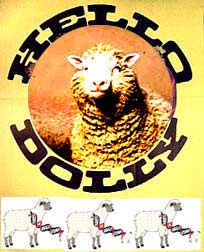|
...thoughts expressed here are not necessarily
final.
May 24, 2004 WEBLOG:
Will blogging change the church?
Joel News publisher Marc van der Woude keeps a weblog in which he reflects
on God, the Church and daily life. This week he summarizes an interesting
and provoking paper by Tim Bednar titled 'We Know More Than Our Pastors:
Why Bloggers Are the Vanguard of the Participatory Church'. Bednar explores
how Christians are using blogging (keeping a weblog) for spiritual formation
and how they are redefining the scope of Martin Luther's 'the priesthood
of the believer'. Bednar states: "As a network, we know more than our
pastors. Thousands of bloggers circumvent established hierarchies and
relate unmediated with one another. We are part of a participatory phenomenon
that is impacting mass media, technology, education, entertainment, politics,
journalism, business - and the church."
LINK: http://marcsmessages.typepad.com/mm/2004/05/we_know_more_th.html
May 24, 2004
A New Kind of Christian review and commentary continued..
Chapter 1- no comment.
Comments on NEO’s view of Modernism. I will have to challenge
every contention of this worldview at some point or another. The propensity
to paint with a broad brush, admitting to it but then proceeding in spite
of the fact only tends to obfuscate the real underlying issues. We settle
for an image or perception instead of reality and Truth if we buy into
these generalities.
| 1. Conquest and control- This is not a modern
construct- the history of man is defined by this. The Bible itself
is a history of conquest- both physically when a called out people
were chosen to purify a piece of real estate called the promised land
to the corrollary conquest by spiritual warfare going on in the unseen
realms. I would posit that there has actually been a loss of the sense
of the latter in modern times. |
 |
 |
2. Age of the machine- little to disagree
with here- the fulfillment of the mandate given in the garden to subdue
the earth is part of the Biblical notion of stewardship . Like with
all good things, fallen man adds to or perverts the motivation of
such endeavors, but they are God given nonetheless. Modern man is
more motivated by the pursuit of ease, comfort, and pleasure than
the realization of proper stewardship, and took the mechanisms to
accomplish this to new levels. |
| 3. Age of analysis- Again- this is not a
modern construct. The Socratic method and the logic of the philosophers
defined the pinnacle of Greek thought which in term impinges upon
history from that point on. It was into this milieu that the incarnate
Word came. One could argue that the advent of the age of reason was
a natural outcome of the expansion of the Kingdom of Heaven on earth.
Specifically, Neo’s contention that modernism marginalized imagination
and systems thinking is pure bunk, IMHO! |
 |
 |
4. The age of secular science manifests problems
in the realms where it divorces itself from mystery. The substitution
of knowledge for faith is Satan’s ploy from the beginning. The
modern age took this to new levels but the underlying problem is one
of sin and autonomy, not science per se which actually glorifies God
as it looks at creation. |
| 5. Age of absolute objectivity-
Yes, the propensity of modern man to seek salvation through knowledge
is devastating but not new. It’s the original sin. It is a continuity
based on the basic nature of fallen man. No one I knows thinks this
way consistently however. |
|
Most people recognize innately that there is
an unknowable theme running through the universe and that accounts for
the myriad of ways of seeking knowledge that manifest themselves in modern
times, just as in the doctrine of perspicuity still attains- Truth we
need for life is still propositional and knowable because it is revealed
to us that way. Again, most people I have contact with find their realities
defined not by science but by seeking to fulfill felt needs and finding
the next experience- typically through arts and entertainment sources
that are ubiquitous in our world.
 |
6. Critical age- The ability of critically
thinking minds to perceive and apologize for truth is not a modern
paradigm shift either. The cultus of winning and competition has reached
new heights (perhaps) in the modern age. Peter Senge’s point
is what? Is Neo saying that there should be no battleground of ideas
based on their variant values? Some ideas (especially heresies) are
by nature losers and therefore need to lose. The issue here is the
preponderance of logical fallacies in communication, not the triumph
of reason. |
| 7. Modern nation-state and organization-No
argument here except to say that the world is a better place in many
ways because of the death of feudalism. Nothing is said of the relationship
and checks and balances that come from the idea of individuation versus
organization. But Plato tackled this issue in The Republic. So it’s
not a modern problem exclusively. |
|
 |
8. Individualism- Again the problem is pervasive
since the fall. The issues are that the God ordained structures for
community- church, family, have taken a back seat to the pursuit of
affluence by the individual. Denominationalism has served to bring
diversity in the non-essentials to the body of Christ, and I think
should be seen as a positive, not negative influence. It is rather
revivalism and its man-focused strains that pervade some of the denominations
that is a bigger negative issue. The departure from Biblical ways
of doing things has always caused problems in the church. The biggest
departure is seeking answers through political or physical mechanisms,
not dying to self and serving and loving God and men. |
| 9. This ties in with his next point- Protestantism
and institutionalized religion are taken together- and that is problematic.
Protestantism isn’t responsible for the institutionalization
of the church- that began happening after Constantine. The book tends
to hit hard against the reformed faith as the pinnacle of modernity
in “religious” circles. Perhaps the book’s characterization
of faith matters as “religion” belies the prejudices of
the author? Biblical faith does not seem to me to be particularly
about religion or religious structures. |
|
 |
10. Consumerism is rife in the church. Correct.
The love of money must have been a problem for Jesus’s time or
he would not have pointed this out as the root of all evil! So what
has changed on this front? Consumerism has always been an issue. The
use of capitalistic methodologies to do church is the problem as I
see it. |
The conquests change, the mechanisms diversify,
the analysis becomes less objective, the criticism becomes more flawed,
the organizations become more imposing, the individuation becomes pervasive,
the protest less informed, and the consumption of information becomes
the most sought after commodity. Yes indeed, the forms are changing but
the functional realization of the most basic notions of our fallenness
have not changed at all.
At one point Neo characterizes the darkness as light- leading proponents
of a deconstructed world are called philosophical lights on page 19. I
have to challenge this presupposition. The notion of philosophy denotes
a love of wisdom. All these proponents of postmodernism would deny that
there is a God in Heaven. Biblically speaking, that makes them fools,
not lovers of wisdom. If Neo is right- pluralism is the hallmark of postmodernism,
we are in for the domination of the philosophy of fools. Polyani, Heidegger
and Hegel do not lead to the place where science, philosophy, history,
and theology meet. A right view of the Creator encompasses a right view
of all of these disciplines/arts/sciences.
Neo has been conformed to high modern philosophy, not set free by the
Truth. Neo is portrayed as the educated one in the pseudo dialogue- actually
it is a monologue at this point. We see early on that Dan turns toward
the dispenser of knowledge- quite esoteric knowledge at that, in his attempt
to sort out his theological questions. This is a serious flaw. The things
of the flesh cannot comprehend the things of the Spirit. I see this flaw
fleshed out in the contemporary church’s appropriation of “mentoring”
both its techniques and biases in lieu of what the Bible calls discipleship.
It is a poor substitute. We only have one teacher to sit at the feet of-
Jesus. We sit there together in community.
|







